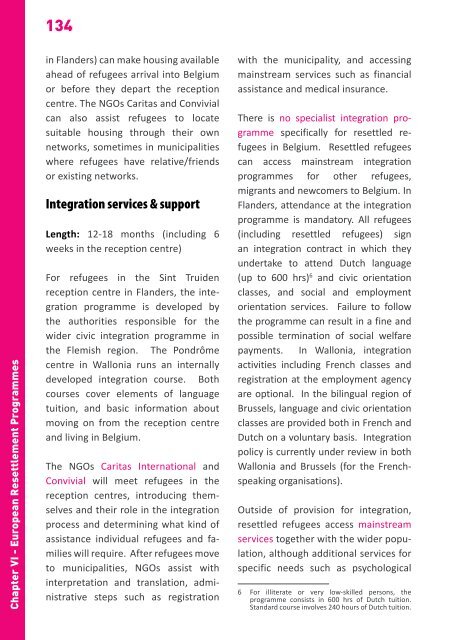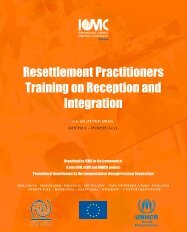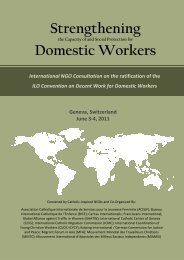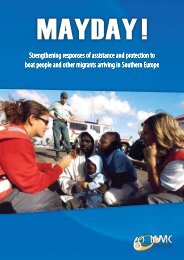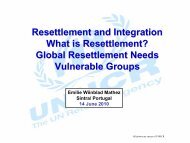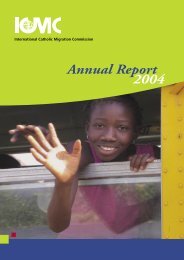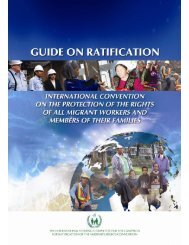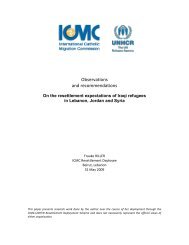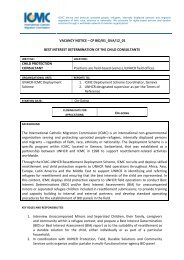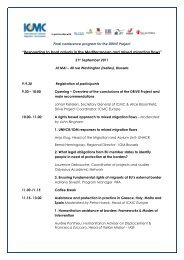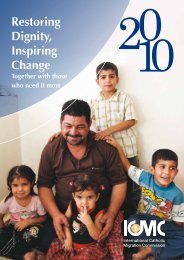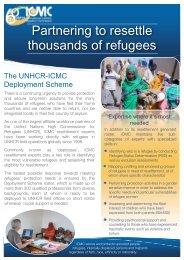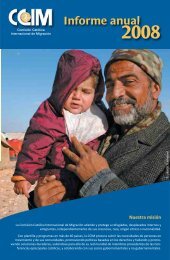ICMCEUROPE WelcometoEurope.pdf (5.89 MB)
ICMCEUROPE WelcometoEurope.pdf (5.89 MB)
ICMCEUROPE WelcometoEurope.pdf (5.89 MB)
You also want an ePaper? Increase the reach of your titles
YUMPU automatically turns print PDFs into web optimized ePapers that Google loves.
134<br />
Chapter VI - European Resettlement Programmes<br />
in Flanders) can make housing available<br />
ahead of refugees arrival into Belgium<br />
or before they depart the reception<br />
centre. The NGOs Caritas and Convivial<br />
can also assist refugees to locate<br />
suitable housing through their own<br />
networks, sometimes in municipalities<br />
where refugees have relative/friends<br />
or existing networks.<br />
Integration services & support<br />
Length: 12-18 months (including 6<br />
weeks in the reception centre)<br />
For refugees in the Sint Truiden<br />
reception centre in Flanders, the integration<br />
programme is developed by<br />
the authorities responsible for the<br />
wider civic integration programme in<br />
the Flemish region. The Pondrôme<br />
centre in Wallonia runs an internally<br />
developed integration course. Both<br />
courses cover elements of language<br />
tuition, and basic information about<br />
moving on from the reception centre<br />
and living in Belgium.<br />
The NGOs Caritas International and<br />
Convivial will meet refugees in the<br />
reception centres, introducing themselves<br />
and their role in the integration<br />
process and determining what kind of<br />
assistance individual refugees and families<br />
will require. After refugees move<br />
to municipalities, NGOs assist with<br />
interpretation and translation, administrative<br />
steps such as registration<br />
with the municipality, and accessing<br />
mainstream services such as financial<br />
assistance and medical insurance.<br />
There is no specialist integration programme<br />
specifically for resettled refugees<br />
in Belgium. Resettled refugees<br />
can access mainstream integration<br />
programmes for other refugees,<br />
migrants and newcomers to Belgium. In<br />
Flanders, attendance at the integration<br />
programme is mandatory. All refugees<br />
(including resettled refugees) sign<br />
an integration contract in which they<br />
undertake to attend Dutch language<br />
(up to 600 hrs) 6 and civic orientation<br />
classes, and social and employment<br />
orientation services. Failure to follow<br />
the programme can result in a fine and<br />
possible termination of social welfare<br />
payments. In Wallonia, integration<br />
activities including French classes and<br />
registration at the employment agency<br />
are optional. In the bilingual region of<br />
Brussels, language and civic orientation<br />
classes are provided both in French and<br />
Dutch on a voluntary basis. Integration<br />
policy is currently under review in both<br />
Wallonia and Brussels (for the Frenchspeaking<br />
organisations).<br />
Outside of provision for integration,<br />
resettled refugees access mainstream<br />
services together with the wider population,<br />
although additional services for<br />
specific needs such as psychological<br />
6 For illiterate or very low-skilled persons, the<br />
programme consists in 600 hrs of Dutch tuition.<br />
Standard course involves 240 hours of Dutch tuition.


